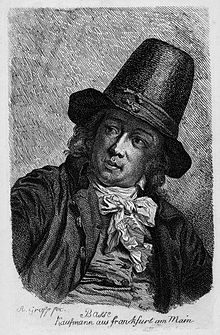Detmar Basse

Detmar Friedrich Wilhelm Basse (born April 6, 1764 in Iserlohn , † June 19, 1836 in Mannheim ) was an entrepreneur , diplomat , pioneer and art collector.
Life
Basse was born as the son of a long-established family of merchants who ran an extensive cloth trade. After school and apprenticeship, Basse himself also worked in supraregional retail. In Frankfurt he successfully founded a branch of the Iserlohn company Becke. For the success of his achievements in trade he was awarded the title of "Court and Commerce Councilor" by the Prussian state in 1788. In Frankfurt he married the daughter of Senator Keller, in whose house Catharina Elisabeth Goethe , the mother of Johann Wolfgang von Goethe , also frequented. From Frankfurt, Basse maintained close trade relations with France . This continued to flourish during the revolution because of his good contacts with the Parisian banking world and leading politicians.
When France occupied Frankfurt in 1796, Basse succeeded in significantly easing the surrender conditions and contributions in favor of the old imperial city. As a thank you, the city council later issued him a certificate for “his tireless activity, cleverness, altruism and loyalty”. Thanks to his connections, Basse also campaigned for the French in favor of the city of Cologne and the economy in the county of Mark . The Landgrave of Hesse even entrusted Basse with negotiating territorial compensation in Paris , Berlin and The Hague .
If Basse had profited from the revolution, the economic crises in the course of the Napoleonic wars and the continental blockade led to the decline of his economic base. His attempt to set up weaving mills for the French market in Iserlohn failed. Then Basse emigrated to Pennsylvania . There he probably ran arable farming on a larger scale. Above all, however, he designed and founded various settlements, including a. Bassenheim and Zelienople in Butler Counties . He also built iron works, operated saw mills and maintained a profitable wool trade.
As a wealthy man, he returned to Germany in 1818 and lived in Mannheim as an art lover and respected citizen.
A grandson of Basses was the Zelienople-born Lutheran clergyman William Alfred Passavant , who brought the first deaconesses to the United States.
literature
- Robert Diehl: Basse, Detmar Friedrich Wilhelm. In: New German Biography (NDB). Volume 1, Duncker & Humblot, Berlin 1953, ISBN 3-428-00182-6 , p. 620 f. ( Digitized version ).
- Rudolf Jung : Basse, Detmar . In: Allgemeine Deutsche Biographie (ADB). Volume 46, Duncker & Humblot, Leipzig 1902, p. 230 f.
- Wilhelm Schulte: Westphalian heads . Münster 1977, ISBN 3-402-05700-X
Web links
- History Jackson (Butler County)
- Basse, Detmar Friedrich Wilhelm. Hessian biography. (As of June 19, 2020). In: Landesgeschichtliches Informationssystem Hessen (LAGIS).
Individual evidence
- ↑ Ekhart Berckenhagen: Anton Graff - life and work. Deutscher Verlag für Kunstwissenschaft, Berlin 1967, p. 55.
| personal data | |
|---|---|
| SURNAME | Basse, Detmar |
| ALTERNATIVE NAMES | Basse, Detmar Friedrich Wilhelm (full name) |
| BRIEF DESCRIPTION | German entrepreneur, diplomat and art collector |
| DATE OF BIRTH | April 6, 1764 |
| PLACE OF BIRTH | Iserlohn |
| DATE OF DEATH | June 19, 1836 |
| Place of death | Mannheim |